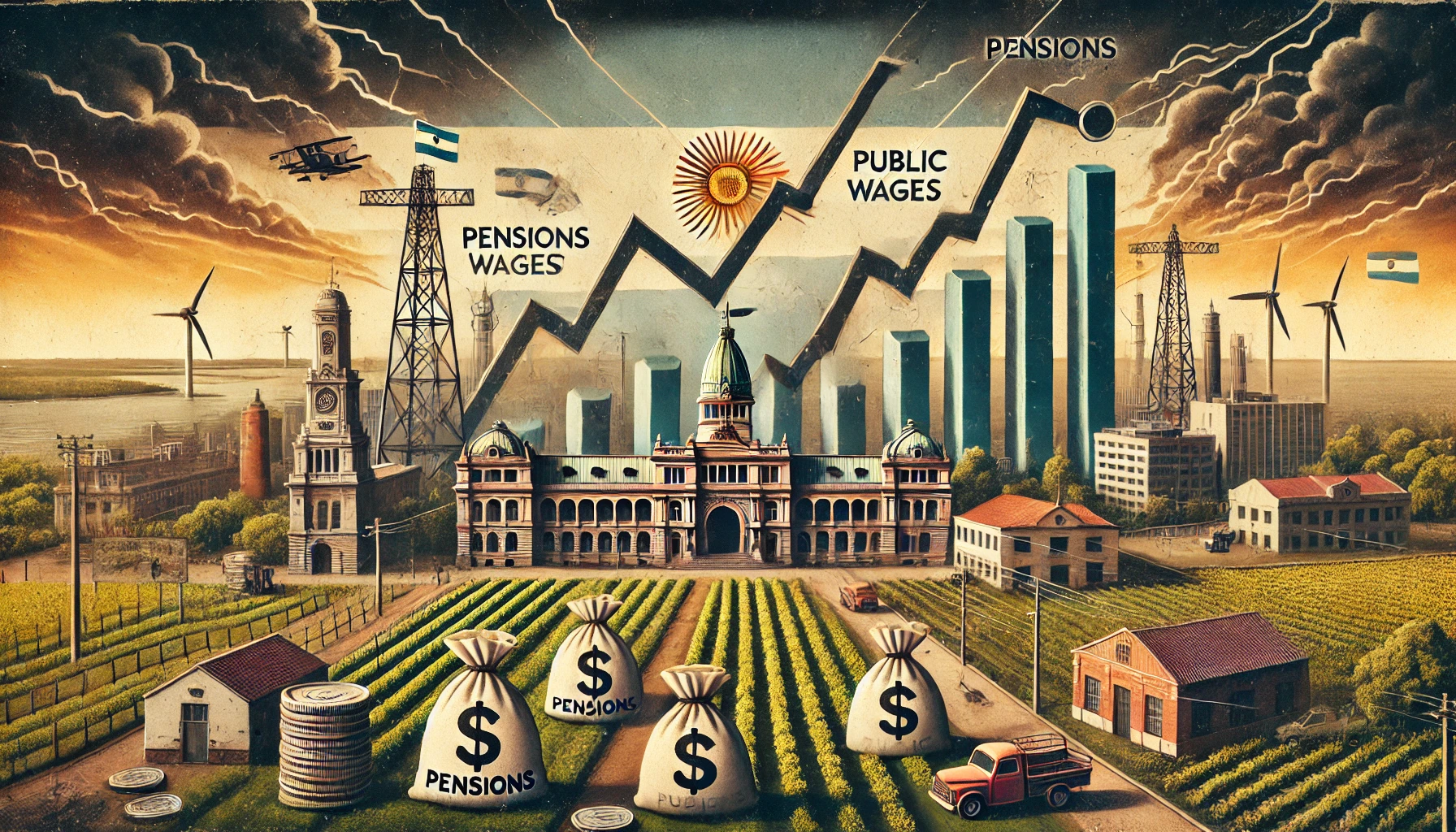Volatile Spending: How Argentina's Pensions and Public Wages Worsen Economic Instability
The paper analyzes Argentina’s highly procyclical fiscal policies, particularly in pensions and public wages, which have worsened economic volatility over the past three decades. It highlights the need for countercyclical fiscal reforms to enhance economic stability and growth.

Researchers Julian Folgar and Francisco Garcia Posleman from the Macroeconomics, Trade and Investment Global Practice, explore the long-standing issue of procyclical fiscal policy in Argentina between 1990 and 2022. Over this period, Argentina became one of the most procyclical countries globally, meaning its fiscal policy expanded during economic upswings and contracted during downturns, further deepening macroeconomic instability. The research analyzes the key drivers of this behavior and highlights how these fiscal practices have consistently exacerbated business cycle volatility, weakened investment, hindered potential economic growth, and disproportionately impacted lower-income households.
Argentina’s Procyclicality: A Deep-Rooted Issue
The paper examines Argentina's fiscal policy within the context of both Keynesian and neoclassical economic theories, which agree on the detrimental effects of procyclical policies. Developing countries, including Argentina, tend to exhibit higher economic volatility than advanced economies, partly due to fiscal policies that are more sensitive to economic cycles. The study identifies that Argentina's procyclicality is primarily driven by expenditure policies, especially related to pensions and public wages, rather than revenue policies. In other words, Argentina's budgetary decisions on public spending have a greater tendency to fluctuate with the economic cycle, reinforcing economic instability rather than mitigating it. Public spending, especially in pensions and wages, shows a high degree of responsiveness to the economic climate, amplifying both booms and busts in the economy.
Pension Spending: A Driver of Economic Instability
One of the primary findings of the study is the strong procyclicality in Argentina's pension spending. Unlike most countries, where pension systems are designed to stabilize income for the elderly regardless of economic conditions, Argentina's pensions tend to rise and fall with the business cycle. This is largely due to poorly designed indexation mechanisms that tie pension benefits to economic variables like tax revenues, which fluctuate significantly during booms and recessions. Instead of smoothing out the impact of economic volatility, Argentina's pension system has contributed to it. The "price effect" – where benefits are adjusted according to inflation or other factors has been a key driver of this procyclicality. The study also points out that erratic policy changes in pension indexation have further aggravated the situation.
Public Wage Bill: Another Source of Volatility
Similarly, the public wage bill in Argentina has shown a pronounced procyclicality, driven by both the "price" effect (the real value of public sector wages) and the "quantity" effect (the number of public servants). Over the past decades, Argentina has experienced significant expansions in public sector employment during economic booms, particularly at the provincial level, with public wages and the number of employees rising sharply during periods of economic growth. These expansions are not easily reversed during downturns, leading to long-term fiscal imbalances. The study reveals that Argentina’s public wage bill is one of the most procyclical in the world, making the country more vulnerable to economic shocks. During periods of economic growth, the government increases wages and hires more employees, further fueling the boom. However, during recessions, the lack of flexibility in reducing public sector employment or wages adds to fiscal stress.
Revenue Policies: A Mixed Picture
In terms of revenue policies, the study finds that Argentina's traditional taxes, such as income and value-added taxes, are relatively acyclical, meaning they do not fluctuate significantly with the business cycle. However, the country relies heavily on unconventional taxes, including export duties and financial transaction taxes, which show a more procyclical behavior. These taxes, introduced as emergency measures during crises, have become a permanent feature of Argentina's fiscal system. Export duties, in particular, have fluctuated significantly depending on global commodity prices, and their correlation with the economic cycle has introduced additional volatility to public revenues.
The Missed Opportunity of a Stabilization Fund
The paper also examines the role of commodity prices in Argentina's fiscal dynamics. The authors suggest that had Argentina established a commodity stabilization fund during the commodities boom in the 2000s, it could have accumulated significant fiscal buffers to cushion against future economic downturns. Such a fund could have helped the country manage the windfall revenues from high commodity prices more effectively, preventing the kind of fiscal imbalances that emerged after the global commodities super-cycle ended in 2008. According to the study, a well-designed stabilization mechanism could have generated revenue equivalent to 2 percent of GDP during the peak of the commodities boom, providing a critical cushion during subsequent downturns.
The paper concludes by stressing that Argentina’s highly procyclical fiscal policies, especially in public spending, have aggravated its economic volatility. While advanced economies tend to use fiscal policy as a tool to stabilize economic fluctuations, Argentina’s approach has amplified these fluctuations. The findings have important implications for policymakers, as they highlight the need for better-designed fiscal policies that can stabilize the economy during both good and bad times. Reducing the procyclicality of public spending, especially in pensions and wages, and implementing countercyclical fiscal tools could significantly enhance Argentina's macroeconomic stability and promote more sustainable long-term growth.
- FIRST PUBLISHED IN:
- Devdiscourse
ALSO READ
Garnacho's Knee Injury Sidelines Him From Argentina's World Cup Qualifiers
Strengthening Ties: India and Argentina Boost Bilateral Trade and Diplomacy
India and Argentina Boost Bilateral Trade Ties
Messi Returns as Argentina Prepares Amid Hurricane Threat
Inflation Crisis in Argentina: Economic Challenges Amid Political Austerity










